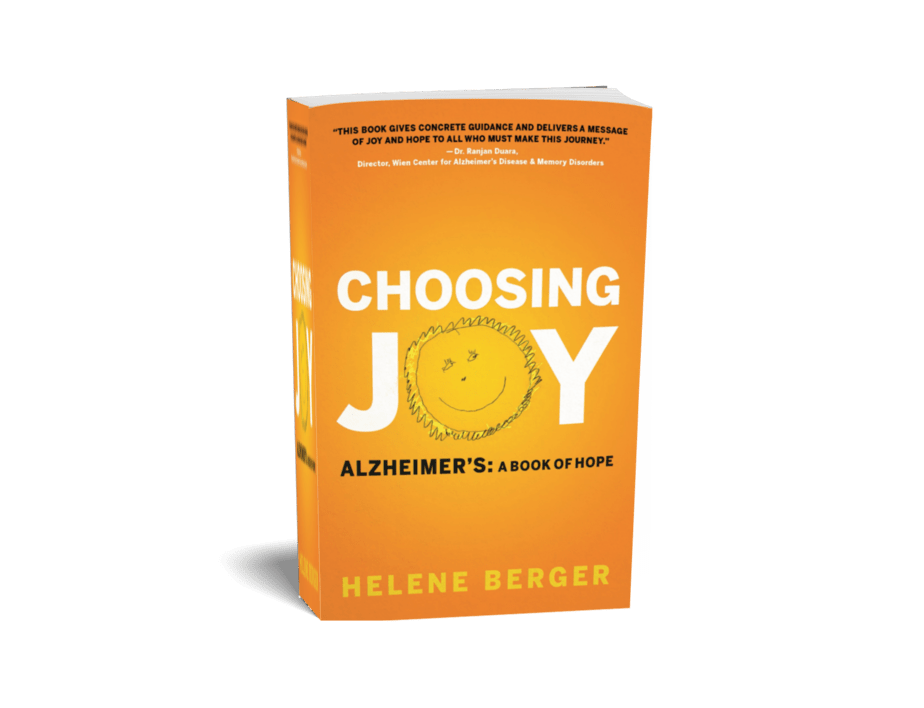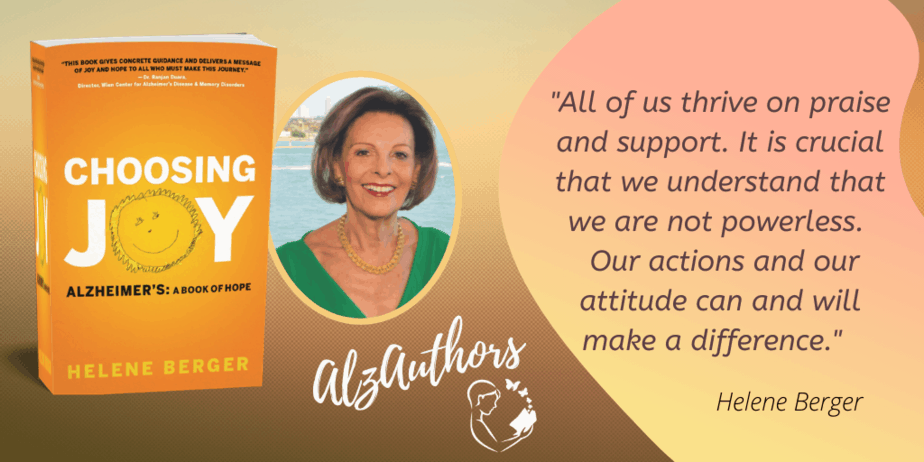 By Helene Berger
By Helene Berger
I write this article during the growing, devastating, worldwide tsunami of the COVID-19 pandemic. It is difficult to speak of Joy and Hope when our lives are so radically changed and loved ones are ill or dying. Yet, perhaps this is precisely the time we have to seek Joy and Hope with greater passion. If we are fortunate enough to be healthy, we must reach out to help others while treating ourselves and others with greater kindness and compassion. It is the time to be grateful for all the good there is in our lives rather focusing on what we don’t have. This background might be the most appropriate way to introduce Choosing Joy, because one theme that permeates the book is “Our attitude can and does make a difference.”
Personal background
Typically, we become paralyzed with despair and helplessness when we learn that a loved one has a debilitating illness. Shortly after our fiftieth anniversary, my husband Ady, was diagnosed with Alzheimer’s. Even though it was not a surprise, I was totally unprepared – as we all are. During that first year as I watched this kind, ethical and loving man deteriorate, a spark of determination ignited in me. I chose not to surrender to the presumed inevitable decline. I devoted all my creative energy to making every moment of our final years together as rich, joyful, meaningful and precious as time allowed.
I never envisioned the success we would achieve. Ady went from telling his doctor upon hearing his diagnosis, “I don’t want to live any more” to being known as “the man with a radiant smile.” Each successive year he was able to do what was unthinkable in the earlier years – including remembering friend’s names, playing the piano for an hour every day, creating for the first time nightly colorful, joyful drawings, and writing nightly love letters to me.
It was never my intention to write a book. It began unwittingly with scribbled notes as a reminder to me (many written in the dark on blank pages of a concert program) simply about what seemed to work and what did not. In the latter years, friends, stunned by his progress, kept asking me for guidance. Their questions inspired Choosing Joy.
I began to play with the “crazy” idea of putting what I learned into a book– especially during what was unexpectedly his final year. Fortunately, I had transcribed the bulk of my illegible notes to my computer. I half-heartedly mentioned the thought to the wonderful doctor I began to see when the difficulties with Ady’s memory could no longer be ignored. Her encouragement (and insistence) did not let go. She witnessed Ady’s remarkable progress and repeatedly told me, “Helene, you have something of value to contribute to the world. You must do it.” It took another eight years until publication, eight exciting years in which I learned so much, eight years in which I transferred the deep sorrow of his loss into the indescribably fulfilling experience of creating a guide to help other caregivers.
An Important Caveat
The story I just described is rare. In no way do I wish to imply that a caregiver who follows the course of action suggested here will have similar success. Hundreds of thousands of deeply caring spouses or family members have given love and devotion beyond measure and still ended up with a loved one who doesn’t recognize them or becomes angry and abusive.
The Power of a Positive Attitude
Unless trained, none of us enters the role as a caregiver with the skills we need. Throughout the book, I have openly reported what worked for us and what did not. I made my share of mistakes. I learned from watching others and asking lots of questions, from keenly observing my husband’s reactions, and most certainly from trial and error. In retrospect, I believe that the creative care I gave my husband uplifted each of our lives. Sadness is diminished when one has a laser sharp sense of purpose.
Our attitude influences the physical and mental health of both our loved one’s life and our own. Victor Frankl, author, philosopher and survivor of the Nazi death camps, wrote, “The one thing no one can take away from us is the right to choose our attitude.” The more we treat our loved ones with kindness and respect, the less they will tend toward anger and the more they will experience contentment. This not as simple as it sounds! The more reassurance we can give, the more we can allow those we care about to preserve their dignity.
All of us thrive on praise and support. It is crucial that we understand that we are not powerless. Our actions and our attitude can and will make a difference. We can choose to live with hope and joy.
 About the Author
About the Author
Helene Berger has held major positions of leadership throughout her life, in her home community of Miami and nationally. In each of these roles, she has spoken throughout the country, marshaling help for large and diverse groups of people with a wide array of needs. She is recognized as a powerful and inspirational speaker.
Choosing Joy: Alzheimer’s: A Book of Hope is her first book. It was inspired by the unanticipated, positive results that her husband Ady achieved after his diagnosis of Alzheimer’s. It is a comprehensive guide, combining the concrete methodologies learned over the following six years, as well as inspirational examples and philosophy. Although written about her experience with Alzheimer’s, her guidance applies to a loved one with any type of debilitating disease – as well as to all the meaningful relationships in our lives. It is a rare book of hope, providing practical and emotional support to both the caregiver and the patient. And all the while, it is a love story, and an honest retelling of a lifetime journey.
Helene is a proud grandmother of four and mother of two. Her son was Chief of Cardiology at Pennsylvania Hospital for eighteen years and her daughter is a Professor of Mathematics at MIT. She is widely published, and the recipient of many prestigious awards. Both continue to offer their mother unconditional support.
To review Helene’s list of Media and Events, visit her website: https://heleneberger.com
Links for Helene:
Facebook: https://www.facebook.com/helenerberger
Twitter: https://twitter.com/HeleneRBerger
Instagram: https://www.instagram.com/helenerberger/



2 Responses
I’m pleased to know a caregiving wife has written a book on her experience. My effort to write a book as the husband of a wife with Alzheimer’s has begun as a blog: stuervay.com. The name of the blog is ALZHEIMER’S AND THE HUSBAND. That will also be the name of the book. The purpose of my writing is the same as Helene’s. It is both a tribute to my spouse and a way to help other caregivers. I am a retired college professor, consultant to public schools, and author of many publications on school improvement. My current service contributions are as a volunteer state leader in AARP.
Thank you for sharing. Being open about our personal experiences with dementia can provide such comfort to others. If you are interested in being profiled on our site, please find a submission form on our contact page.